Business Law: ASIC v Australian Property Custodian Holdings
VerifiedAdded on 2020/05/28
|11
|2533
|48
Report
AI Summary
This report analyzes the landmark Australian Federal Court case, ASIC v Australian Property Custodian Holdings Limited (NO 3) [2013] FCA 1342, where the Australian Securities and Investments Commission (ASIC) alleged breaches of the Corporations Act 2001 (Cth). The case involved Australian Property Custodian Holdings Limited (APCHL) and its directors, concerning the managed investment scheme of the Aged Care Property Trust. The report details the breaches of duties, including contraventions of sections related to the responsible entity's obligations, related party transactions, and directors' responsibilities. The analysis covers the lodgment resolution, listing fees, and the court's findings regarding the directors' conflicts of interest and failure to exercise due care. The relevance of the decision to the development of Australian Corporation Law is discussed, highlighting the implications for corporate governance and directors' duties within the Australian legal framework. The report provides a comprehensive overview of the case, its legal implications, and its significance in shaping Australian corporate law.
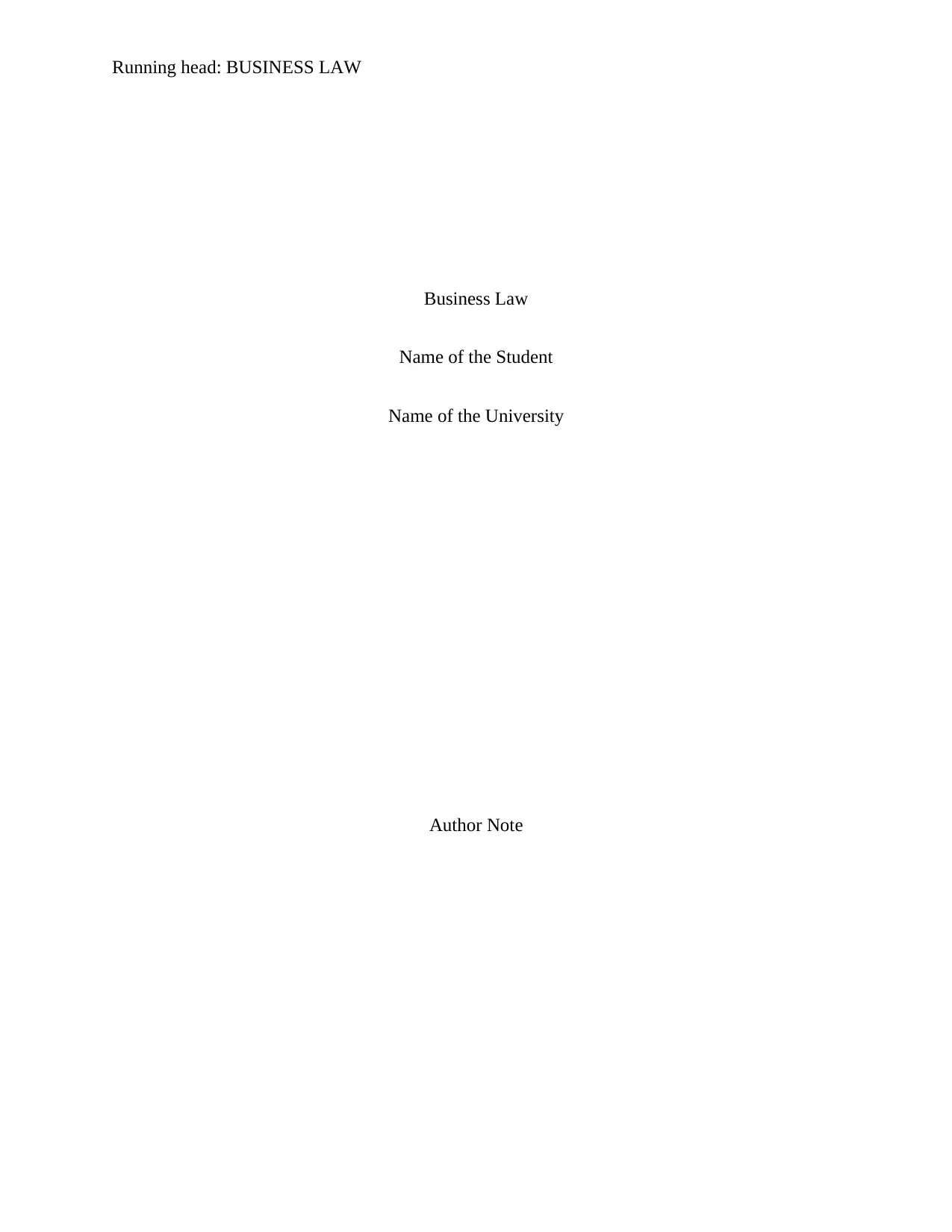
Running head: BUSINESS LAW
Business Law
Name of the Student
Name of the University
Author Note
Business Law
Name of the Student
Name of the University
Author Note
Paraphrase This Document
Need a fresh take? Get an instant paraphrase of this document with our AI Paraphraser
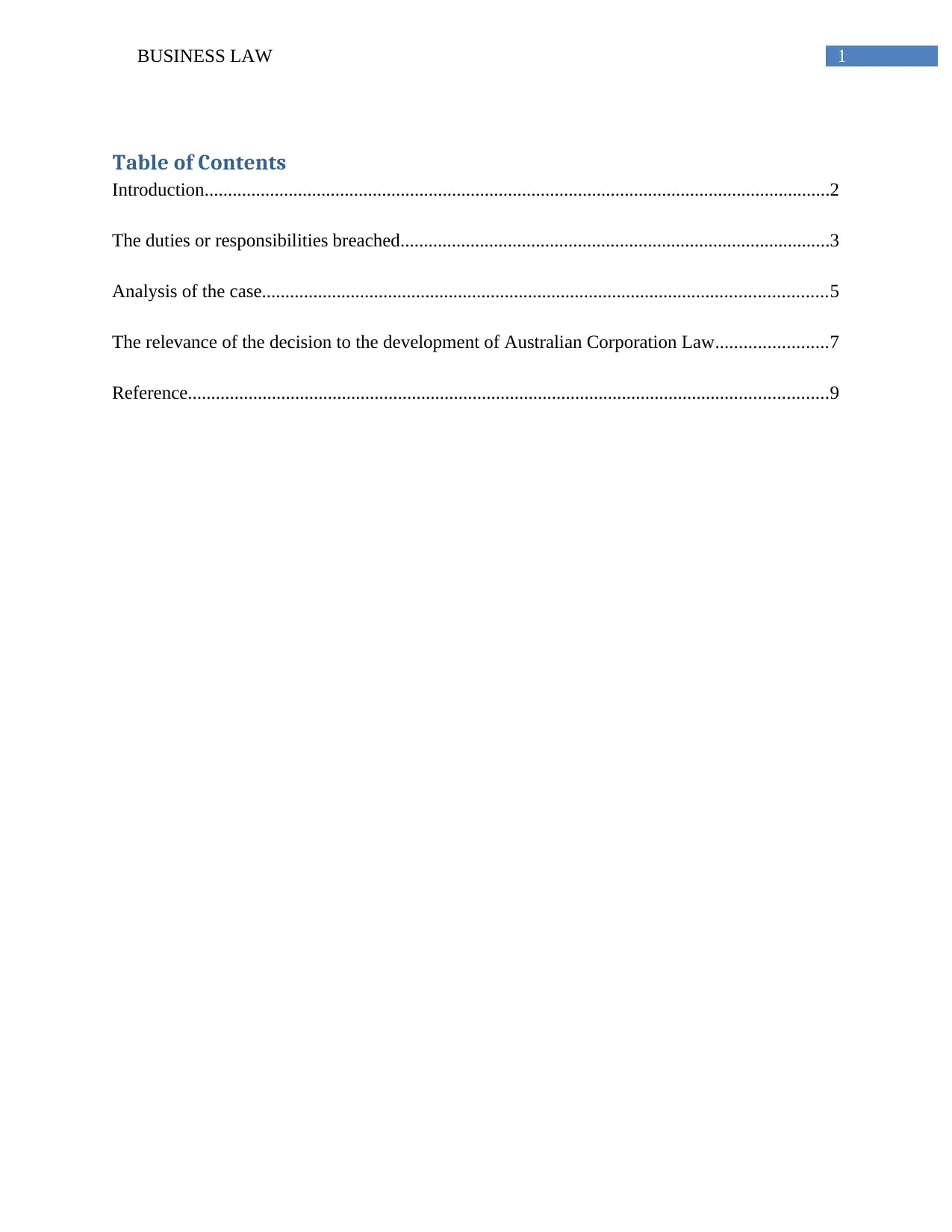
1BUSINESS LAW
Table of Contents
Introduction......................................................................................................................................2
The duties or responsibilities breached............................................................................................3
Analysis of the case.........................................................................................................................5
The relevance of the decision to the development of Australian Corporation Law........................7
Reference.........................................................................................................................................9
Table of Contents
Introduction......................................................................................................................................2
The duties or responsibilities breached............................................................................................3
Analysis of the case.........................................................................................................................5
The relevance of the decision to the development of Australian Corporation Law........................7
Reference.........................................................................................................................................9
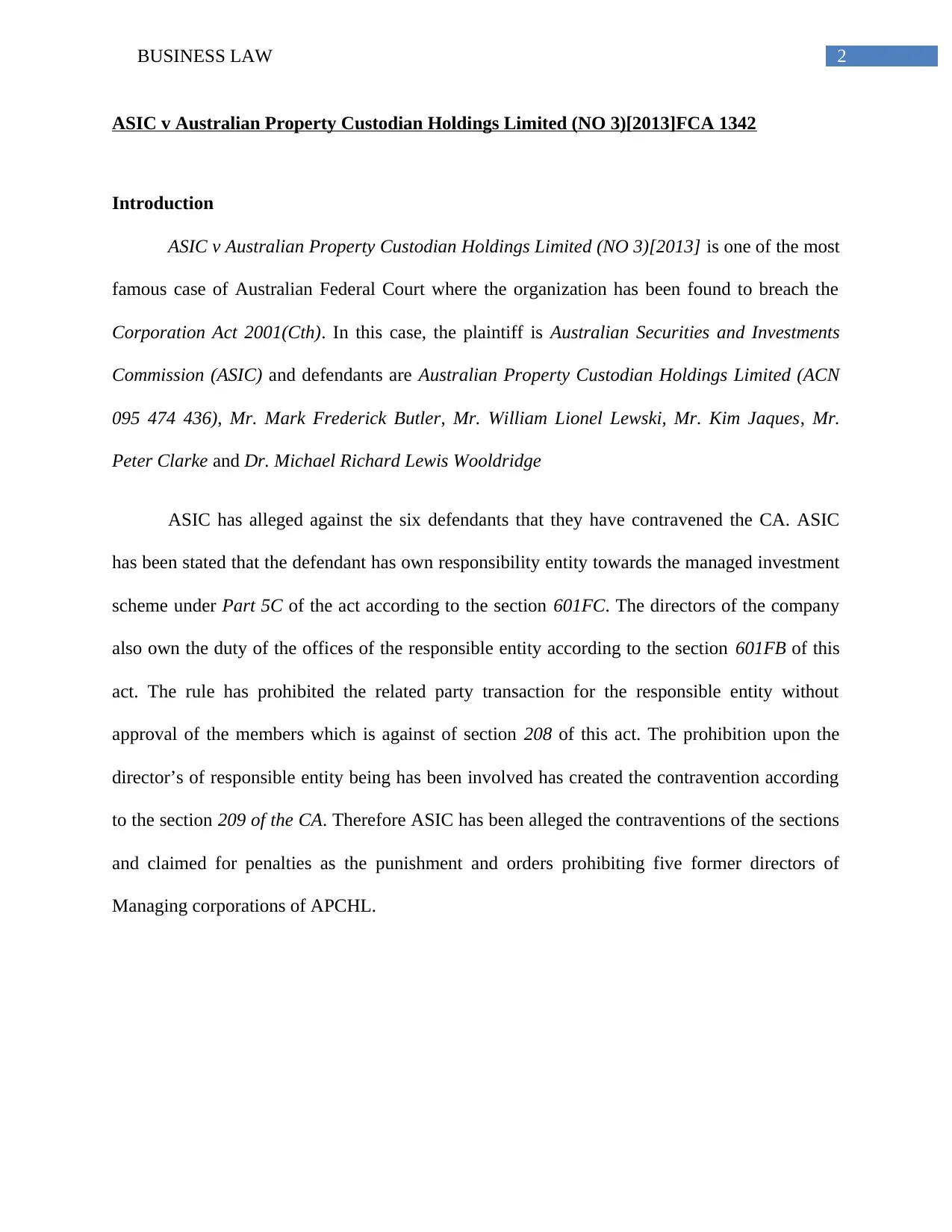
2BUSINESS LAW
ASIC v Australian Property Custodian Holdings Limited (NO 3)[2013]FCA 1342
Introduction
ASIC v Australian Property Custodian Holdings Limited (NO 3)[2013] is one of the most
famous case of Australian Federal Court where the organization has been found to breach the
Corporation Act 2001(Cth). In this case, the plaintiff is Australian Securities and Investments
Commission (ASIC) and defendants are Australian Property Custodian Holdings Limited (ACN
095 474 436), Mr. Mark Frederick Butler, Mr. William Lionel Lewski, Mr. Kim Jaques, Mr.
Peter Clarke and Dr. Michael Richard Lewis Wooldridge
ASIC has alleged against the six defendants that they have contravened the CA. ASIC
has been stated that the defendant has own responsibility entity towards the managed investment
scheme under Part 5C of the act according to the section 601FC. The directors of the company
also own the duty of the offices of the responsible entity according to the section 601FB of this
act. The rule has prohibited the related party transaction for the responsible entity without
approval of the members which is against of section 208 of this act. The prohibition upon the
director’s of responsible entity being has been involved has created the contravention according
to the section 209 of the CA. Therefore ASIC has been alleged the contraventions of the sections
and claimed for penalties as the punishment and orders prohibiting five former directors of
Managing corporations of APCHL.
ASIC v Australian Property Custodian Holdings Limited (NO 3)[2013]FCA 1342
Introduction
ASIC v Australian Property Custodian Holdings Limited (NO 3)[2013] is one of the most
famous case of Australian Federal Court where the organization has been found to breach the
Corporation Act 2001(Cth). In this case, the plaintiff is Australian Securities and Investments
Commission (ASIC) and defendants are Australian Property Custodian Holdings Limited (ACN
095 474 436), Mr. Mark Frederick Butler, Mr. William Lionel Lewski, Mr. Kim Jaques, Mr.
Peter Clarke and Dr. Michael Richard Lewis Wooldridge
ASIC has alleged against the six defendants that they have contravened the CA. ASIC
has been stated that the defendant has own responsibility entity towards the managed investment
scheme under Part 5C of the act according to the section 601FC. The directors of the company
also own the duty of the offices of the responsible entity according to the section 601FB of this
act. The rule has prohibited the related party transaction for the responsible entity without
approval of the members which is against of section 208 of this act. The prohibition upon the
director’s of responsible entity being has been involved has created the contravention according
to the section 209 of the CA. Therefore ASIC has been alleged the contraventions of the sections
and claimed for penalties as the punishment and orders prohibiting five former directors of
Managing corporations of APCHL.
⊘ This is a preview!⊘
Do you want full access?
Subscribe today to unlock all pages.

Trusted by 1+ million students worldwide
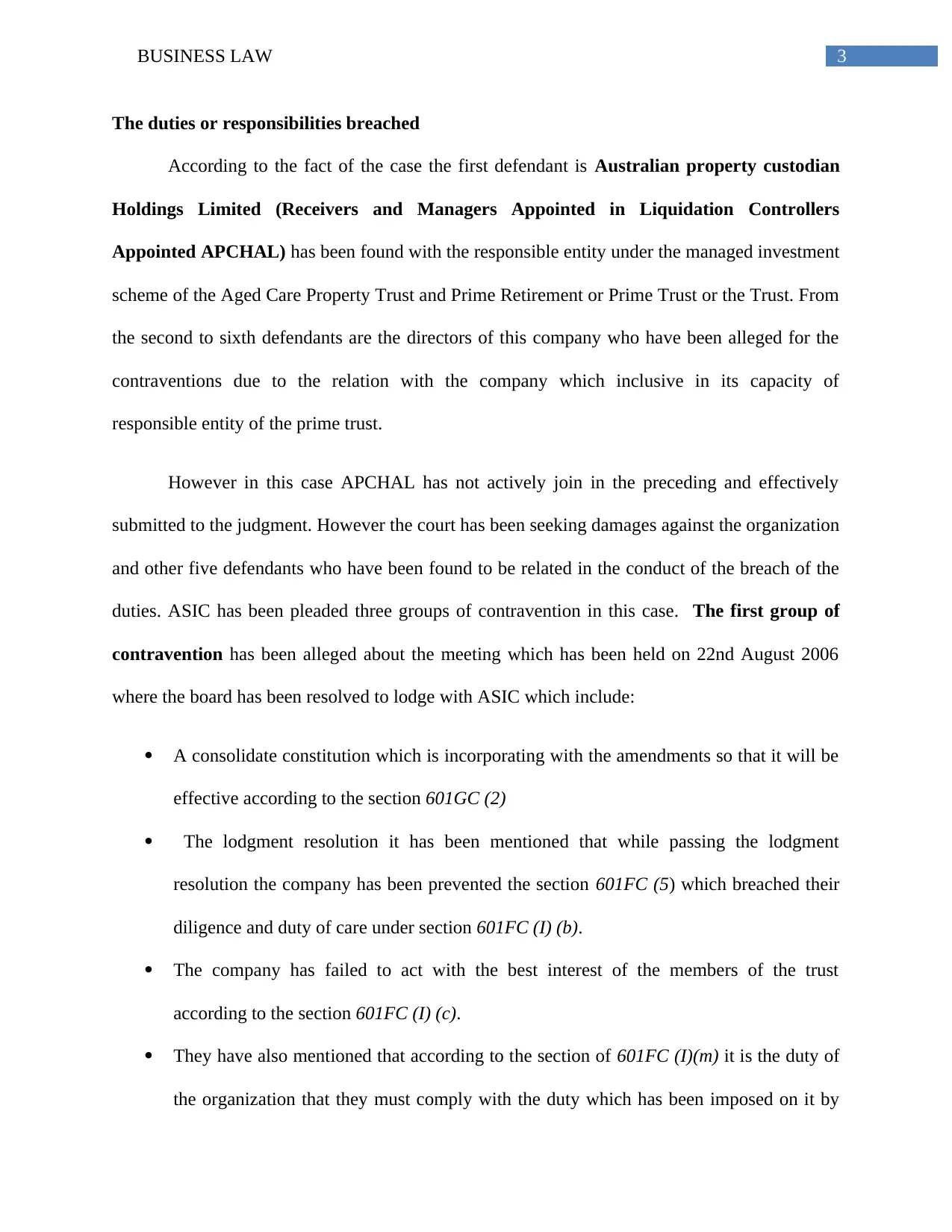
3BUSINESS LAW
The duties or responsibilities breached
According to the fact of the case the first defendant is Australian property custodian
Holdings Limited (Receivers and Managers Appointed in Liquidation Controllers
Appointed APCHAL) has been found with the responsible entity under the managed investment
scheme of the Aged Care Property Trust and Prime Retirement or Prime Trust or the Trust. From
the second to sixth defendants are the directors of this company who have been alleged for the
contraventions due to the relation with the company which inclusive in its capacity of
responsible entity of the prime trust.
However in this case APCHAL has not actively join in the preceding and effectively
submitted to the judgment. However the court has been seeking damages against the organization
and other five defendants who have been found to be related in the conduct of the breach of the
duties. ASIC has been pleaded three groups of contravention in this case. The first group of
contravention has been alleged about the meeting which has been held on 22nd August 2006
where the board has been resolved to lodge with ASIC which include:
A consolidate constitution which is incorporating with the amendments so that it will be
effective according to the section 601GC (2)
The lodgment resolution it has been mentioned that while passing the lodgment
resolution the company has been prevented the section 601FC (5) which breached their
diligence and duty of care under section 601FC (I) (b).
The company has failed to act with the best interest of the members of the trust
according to the section 601FC (I) (c).
They have also mentioned that according to the section of 601FC (I)(m) it is the duty of
the organization that they must comply with the duty which has been imposed on it by
The duties or responsibilities breached
According to the fact of the case the first defendant is Australian property custodian
Holdings Limited (Receivers and Managers Appointed in Liquidation Controllers
Appointed APCHAL) has been found with the responsible entity under the managed investment
scheme of the Aged Care Property Trust and Prime Retirement or Prime Trust or the Trust. From
the second to sixth defendants are the directors of this company who have been alleged for the
contraventions due to the relation with the company which inclusive in its capacity of
responsible entity of the prime trust.
However in this case APCHAL has not actively join in the preceding and effectively
submitted to the judgment. However the court has been seeking damages against the organization
and other five defendants who have been found to be related in the conduct of the breach of the
duties. ASIC has been pleaded three groups of contravention in this case. The first group of
contravention has been alleged about the meeting which has been held on 22nd August 2006
where the board has been resolved to lodge with ASIC which include:
A consolidate constitution which is incorporating with the amendments so that it will be
effective according to the section 601GC (2)
The lodgment resolution it has been mentioned that while passing the lodgment
resolution the company has been prevented the section 601FC (5) which breached their
diligence and duty of care under section 601FC (I) (b).
The company has failed to act with the best interest of the members of the trust
according to the section 601FC (I) (c).
They have also mentioned that according to the section of 601FC (I)(m) it is the duty of
the organization that they must comply with the duty which has been imposed on it by
Paraphrase This Document
Need a fresh take? Get an instant paraphrase of this document with our AI Paraphraser
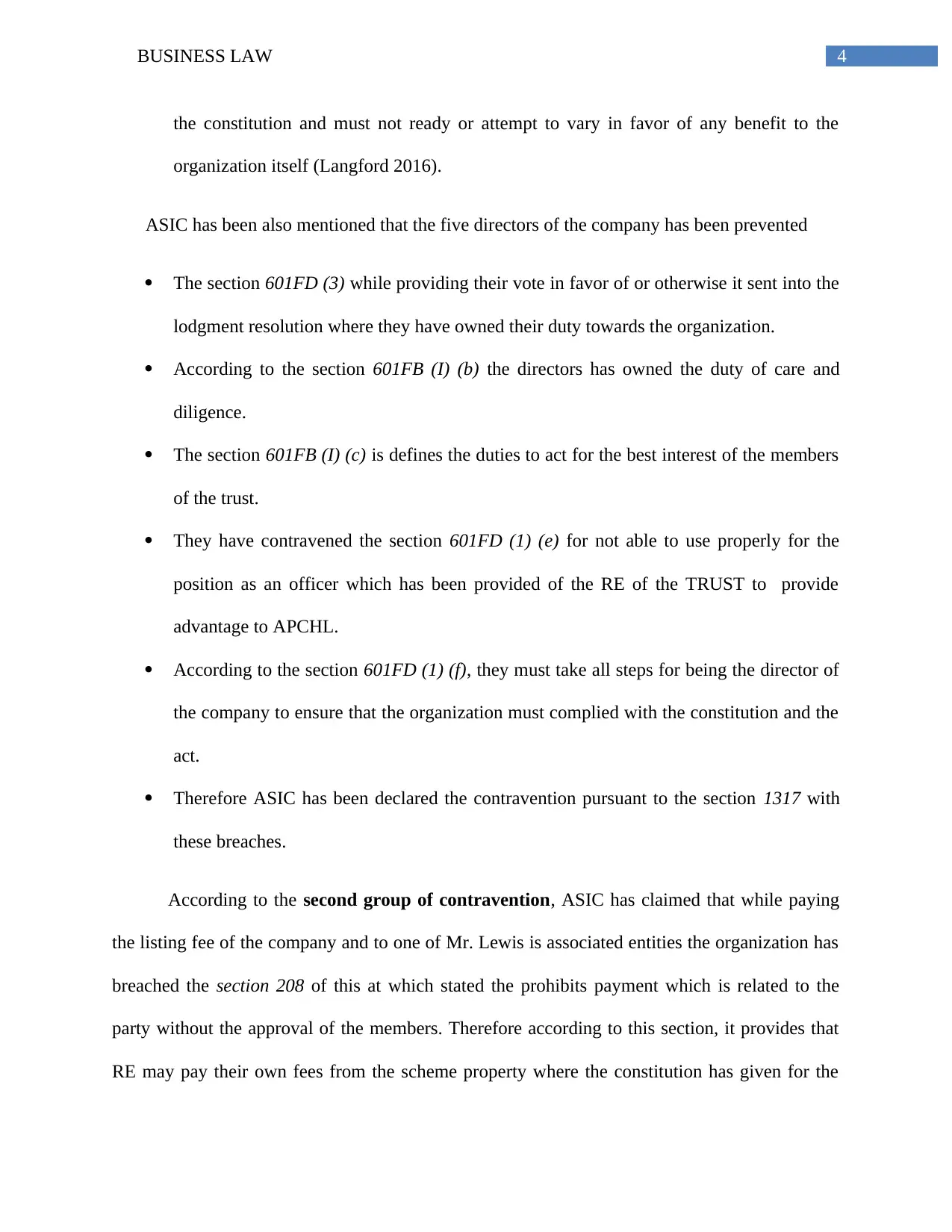
4BUSINESS LAW
the constitution and must not ready or attempt to vary in favor of any benefit to the
organization itself (Langford 2016).
ASIC has been also mentioned that the five directors of the company has been prevented
The section 601FD (3) while providing their vote in favor of or otherwise it sent into the
lodgment resolution where they have owned their duty towards the organization.
According to the section 601FB (I) (b) the directors has owned the duty of care and
diligence.
The section 601FB (I) (c) is defines the duties to act for the best interest of the members
of the trust.
They have contravened the section 601FD (1) (e) for not able to use properly for the
position as an officer which has been provided of the RE of the TRUST to provide
advantage to APCHL.
According to the section 601FD (1) (f), they must take all steps for being the director of
the company to ensure that the organization must complied with the constitution and the
act.
Therefore ASIC has been declared the contravention pursuant to the section 1317 with
these breaches.
According to the second group of contravention, ASIC has claimed that while paying
the listing fee of the company and to one of Mr. Lewis is associated entities the organization has
breached the section 208 of this at which stated the prohibits payment which is related to the
party without the approval of the members. Therefore according to this section, it provides that
RE may pay their own fees from the scheme property where the constitution has given for the
the constitution and must not ready or attempt to vary in favor of any benefit to the
organization itself (Langford 2016).
ASIC has been also mentioned that the five directors of the company has been prevented
The section 601FD (3) while providing their vote in favor of or otherwise it sent into the
lodgment resolution where they have owned their duty towards the organization.
According to the section 601FB (I) (b) the directors has owned the duty of care and
diligence.
The section 601FB (I) (c) is defines the duties to act for the best interest of the members
of the trust.
They have contravened the section 601FD (1) (e) for not able to use properly for the
position as an officer which has been provided of the RE of the TRUST to provide
advantage to APCHL.
According to the section 601FD (1) (f), they must take all steps for being the director of
the company to ensure that the organization must complied with the constitution and the
act.
Therefore ASIC has been declared the contravention pursuant to the section 1317 with
these breaches.
According to the second group of contravention, ASIC has claimed that while paying
the listing fee of the company and to one of Mr. Lewis is associated entities the organization has
breached the section 208 of this at which stated the prohibits payment which is related to the
party without the approval of the members. Therefore according to this section, it provides that
RE may pay their own fees from the scheme property where the constitution has given for the
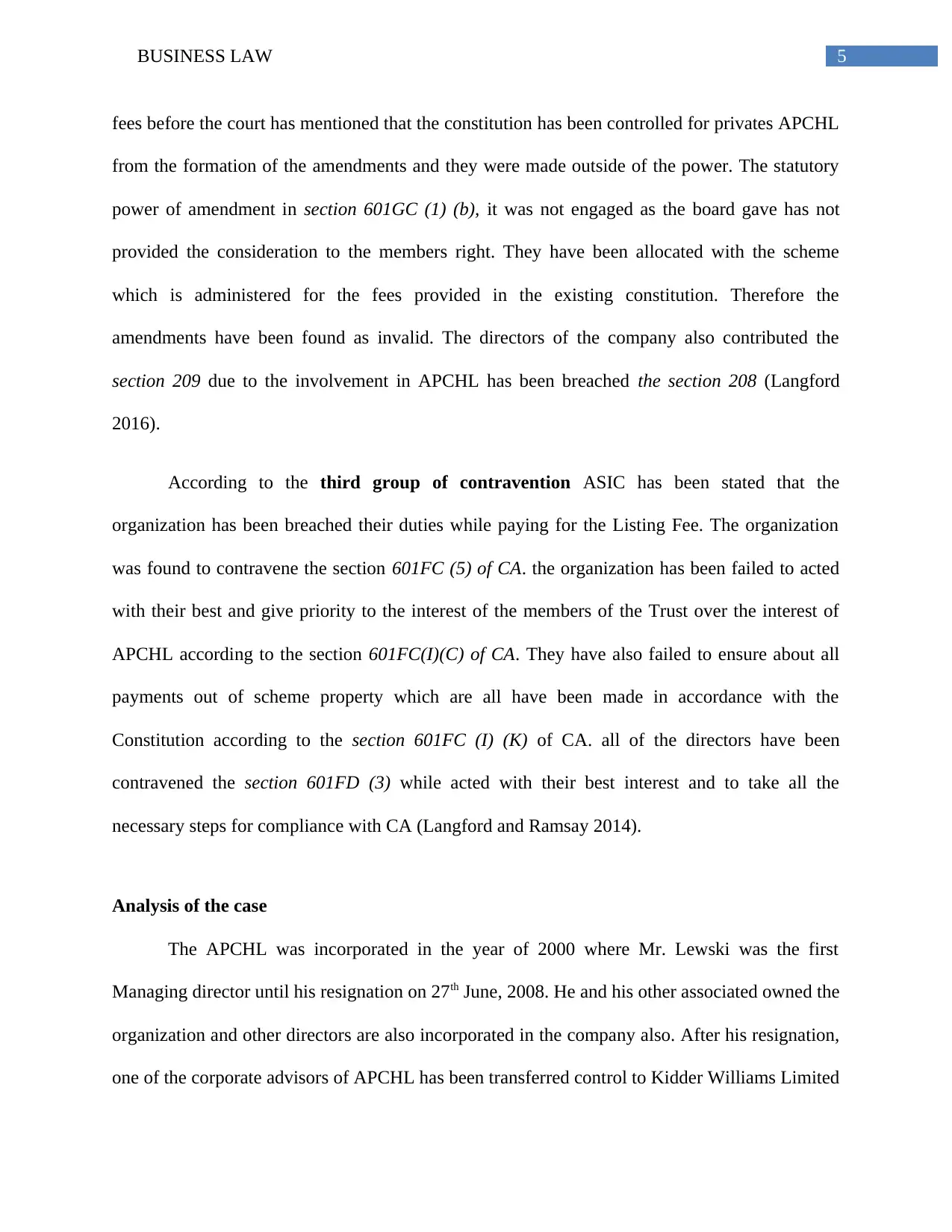
5BUSINESS LAW
fees before the court has mentioned that the constitution has been controlled for privates APCHL
from the formation of the amendments and they were made outside of the power. The statutory
power of amendment in section 601GC (1) (b), it was not engaged as the board gave has not
provided the consideration to the members right. They have been allocated with the scheme
which is administered for the fees provided in the existing constitution. Therefore the
amendments have been found as invalid. The directors of the company also contributed the
section 209 due to the involvement in APCHL has been breached the section 208 (Langford
2016).
According to the third group of contravention ASIC has been stated that the
organization has been breached their duties while paying for the Listing Fee. The organization
was found to contravene the section 601FC (5) of CA. the organization has been failed to acted
with their best and give priority to the interest of the members of the Trust over the interest of
APCHL according to the section 601FC(I)(C) of CA. They have also failed to ensure about all
payments out of scheme property which are all have been made in accordance with the
Constitution according to the section 601FC (I) (K) of CA. all of the directors have been
contravened the section 601FD (3) while acted with their best interest and to take all the
necessary steps for compliance with CA (Langford and Ramsay 2014).
Analysis of the case
The APCHL was incorporated in the year of 2000 where Mr. Lewski was the first
Managing director until his resignation on 27th June, 2008. He and his other associated owned the
organization and other directors are also incorporated in the company also. After his resignation,
one of the corporate advisors of APCHL has been transferred control to Kidder Williams Limited
fees before the court has mentioned that the constitution has been controlled for privates APCHL
from the formation of the amendments and they were made outside of the power. The statutory
power of amendment in section 601GC (1) (b), it was not engaged as the board gave has not
provided the consideration to the members right. They have been allocated with the scheme
which is administered for the fees provided in the existing constitution. Therefore the
amendments have been found as invalid. The directors of the company also contributed the
section 209 due to the involvement in APCHL has been breached the section 208 (Langford
2016).
According to the third group of contravention ASIC has been stated that the
organization has been breached their duties while paying for the Listing Fee. The organization
was found to contravene the section 601FC (5) of CA. the organization has been failed to acted
with their best and give priority to the interest of the members of the Trust over the interest of
APCHL according to the section 601FC(I)(C) of CA. They have also failed to ensure about all
payments out of scheme property which are all have been made in accordance with the
Constitution according to the section 601FC (I) (K) of CA. all of the directors have been
contravened the section 601FD (3) while acted with their best interest and to take all the
necessary steps for compliance with CA (Langford and Ramsay 2014).
Analysis of the case
The APCHL was incorporated in the year of 2000 where Mr. Lewski was the first
Managing director until his resignation on 27th June, 2008. He and his other associated owned the
organization and other directors are also incorporated in the company also. After his resignation,
one of the corporate advisors of APCHL has been transferred control to Kidder Williams Limited
⊘ This is a preview!⊘
Do you want full access?
Subscribe today to unlock all pages.

Trusted by 1+ million students worldwide
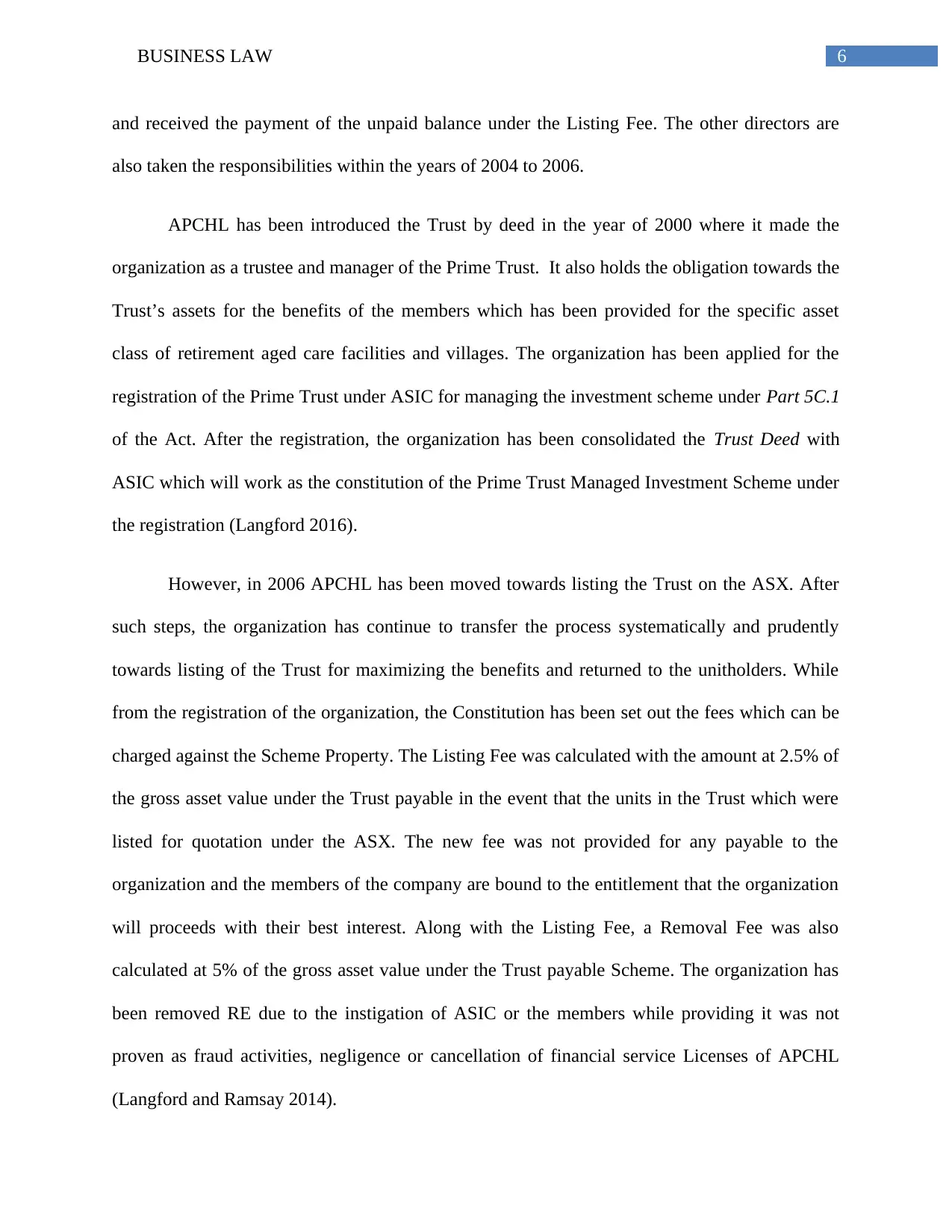
6BUSINESS LAW
and received the payment of the unpaid balance under the Listing Fee. The other directors are
also taken the responsibilities within the years of 2004 to 2006.
APCHL has been introduced the Trust by deed in the year of 2000 where it made the
organization as a trustee and manager of the Prime Trust. It also holds the obligation towards the
Trust’s assets for the benefits of the members which has been provided for the specific asset
class of retirement aged care facilities and villages. The organization has been applied for the
registration of the Prime Trust under ASIC for managing the investment scheme under Part 5C.1
of the Act. After the registration, the organization has been consolidated the Trust Deed with
ASIC which will work as the constitution of the Prime Trust Managed Investment Scheme under
the registration (Langford 2016).
However, in 2006 APCHL has been moved towards listing the Trust on the ASX. After
such steps, the organization has continue to transfer the process systematically and prudently
towards listing of the Trust for maximizing the benefits and returned to the unitholders. While
from the registration of the organization, the Constitution has been set out the fees which can be
charged against the Scheme Property. The Listing Fee was calculated with the amount at 2.5% of
the gross asset value under the Trust payable in the event that the units in the Trust which were
listed for quotation under the ASX. The new fee was not provided for any payable to the
organization and the members of the company are bound to the entitlement that the organization
will proceeds with their best interest. Along with the Listing Fee, a Removal Fee was also
calculated at 5% of the gross asset value under the Trust payable Scheme. The organization has
been removed RE due to the instigation of ASIC or the members while providing it was not
proven as fraud activities, negligence or cancellation of financial service Licenses of APCHL
(Langford and Ramsay 2014).
and received the payment of the unpaid balance under the Listing Fee. The other directors are
also taken the responsibilities within the years of 2004 to 2006.
APCHL has been introduced the Trust by deed in the year of 2000 where it made the
organization as a trustee and manager of the Prime Trust. It also holds the obligation towards the
Trust’s assets for the benefits of the members which has been provided for the specific asset
class of retirement aged care facilities and villages. The organization has been applied for the
registration of the Prime Trust under ASIC for managing the investment scheme under Part 5C.1
of the Act. After the registration, the organization has been consolidated the Trust Deed with
ASIC which will work as the constitution of the Prime Trust Managed Investment Scheme under
the registration (Langford 2016).
However, in 2006 APCHL has been moved towards listing the Trust on the ASX. After
such steps, the organization has continue to transfer the process systematically and prudently
towards listing of the Trust for maximizing the benefits and returned to the unitholders. While
from the registration of the organization, the Constitution has been set out the fees which can be
charged against the Scheme Property. The Listing Fee was calculated with the amount at 2.5% of
the gross asset value under the Trust payable in the event that the units in the Trust which were
listed for quotation under the ASX. The new fee was not provided for any payable to the
organization and the members of the company are bound to the entitlement that the organization
will proceeds with their best interest. Along with the Listing Fee, a Removal Fee was also
calculated at 5% of the gross asset value under the Trust payable Scheme. The organization has
been removed RE due to the instigation of ASIC or the members while providing it was not
proven as fraud activities, negligence or cancellation of financial service Licenses of APCHL
(Langford and Ramsay 2014).
Paraphrase This Document
Need a fresh take? Get an instant paraphrase of this document with our AI Paraphraser
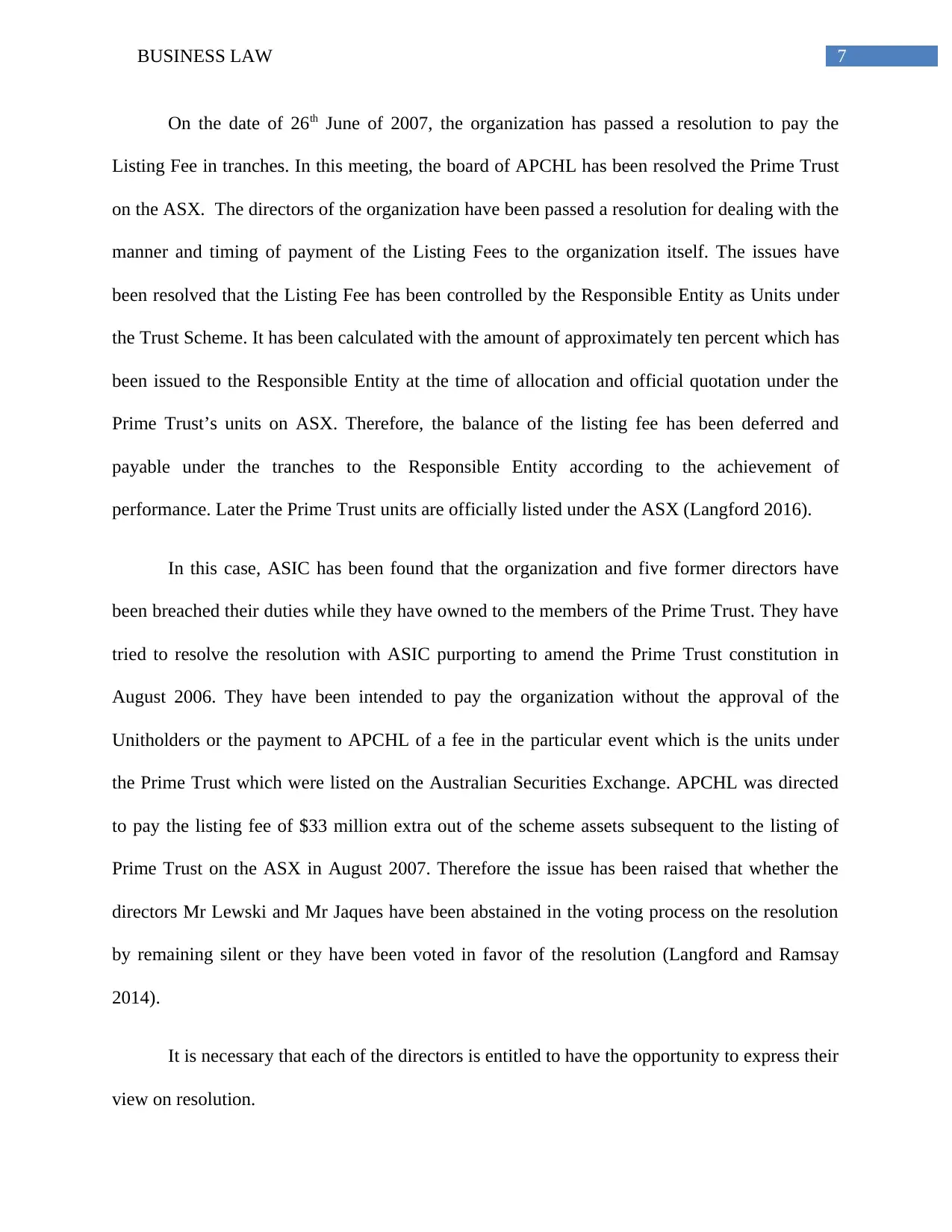
7BUSINESS LAW
On the date of 26th June of 2007, the organization has passed a resolution to pay the
Listing Fee in tranches. In this meeting, the board of APCHL has been resolved the Prime Trust
on the ASX. The directors of the organization have been passed a resolution for dealing with the
manner and timing of payment of the Listing Fees to the organization itself. The issues have
been resolved that the Listing Fee has been controlled by the Responsible Entity as Units under
the Trust Scheme. It has been calculated with the amount of approximately ten percent which has
been issued to the Responsible Entity at the time of allocation and official quotation under the
Prime Trust’s units on ASX. Therefore, the balance of the listing fee has been deferred and
payable under the tranches to the Responsible Entity according to the achievement of
performance. Later the Prime Trust units are officially listed under the ASX (Langford 2016).
In this case, ASIC has been found that the organization and five former directors have
been breached their duties while they have owned to the members of the Prime Trust. They have
tried to resolve the resolution with ASIC purporting to amend the Prime Trust constitution in
August 2006. They have been intended to pay the organization without the approval of the
Unitholders or the payment to APCHL of a fee in the particular event which is the units under
the Prime Trust which were listed on the Australian Securities Exchange. APCHL was directed
to pay the listing fee of $33 million extra out of the scheme assets subsequent to the listing of
Prime Trust on the ASX in August 2007. Therefore the issue has been raised that whether the
directors Mr Lewski and Mr Jaques have been abstained in the voting process on the resolution
by remaining silent or they have been voted in favor of the resolution (Langford and Ramsay
2014).
It is necessary that each of the directors is entitled to have the opportunity to express their
view on resolution.
On the date of 26th June of 2007, the organization has passed a resolution to pay the
Listing Fee in tranches. In this meeting, the board of APCHL has been resolved the Prime Trust
on the ASX. The directors of the organization have been passed a resolution for dealing with the
manner and timing of payment of the Listing Fees to the organization itself. The issues have
been resolved that the Listing Fee has been controlled by the Responsible Entity as Units under
the Trust Scheme. It has been calculated with the amount of approximately ten percent which has
been issued to the Responsible Entity at the time of allocation and official quotation under the
Prime Trust’s units on ASX. Therefore, the balance of the listing fee has been deferred and
payable under the tranches to the Responsible Entity according to the achievement of
performance. Later the Prime Trust units are officially listed under the ASX (Langford 2016).
In this case, ASIC has been found that the organization and five former directors have
been breached their duties while they have owned to the members of the Prime Trust. They have
tried to resolve the resolution with ASIC purporting to amend the Prime Trust constitution in
August 2006. They have been intended to pay the organization without the approval of the
Unitholders or the payment to APCHL of a fee in the particular event which is the units under
the Prime Trust which were listed on the Australian Securities Exchange. APCHL was directed
to pay the listing fee of $33 million extra out of the scheme assets subsequent to the listing of
Prime Trust on the ASX in August 2007. Therefore the issue has been raised that whether the
directors Mr Lewski and Mr Jaques have been abstained in the voting process on the resolution
by remaining silent or they have been voted in favor of the resolution (Langford and Ramsay
2014).
It is necessary that each of the directors is entitled to have the opportunity to express their
view on resolution.
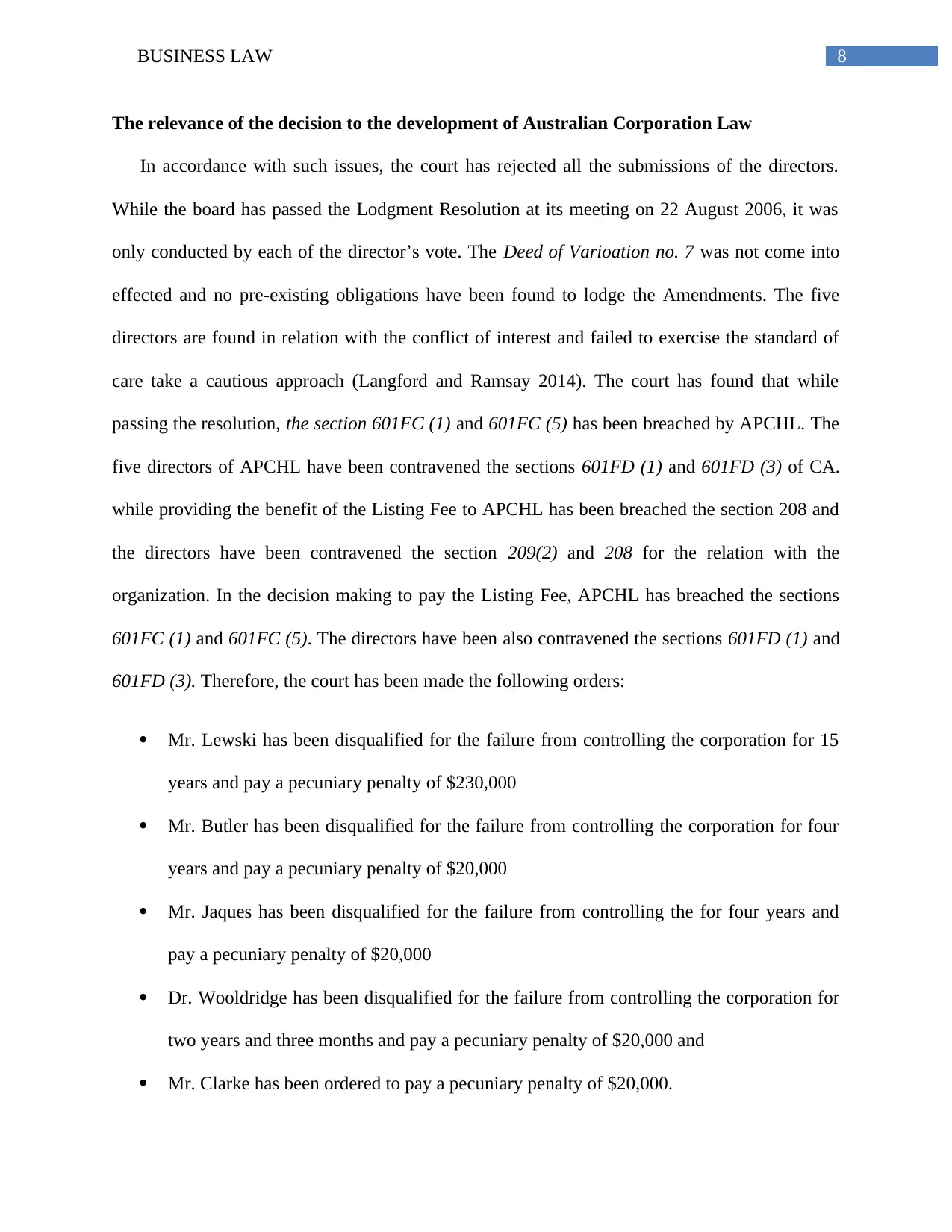
8BUSINESS LAW
The relevance of the decision to the development of Australian Corporation Law
In accordance with such issues, the court has rejected all the submissions of the directors.
While the board has passed the Lodgment Resolution at its meeting on 22 August 2006, it was
only conducted by each of the director’s vote. The Deed of Varioation no. 7 was not come into
effected and no pre-existing obligations have been found to lodge the Amendments. The five
directors are found in relation with the conflict of interest and failed to exercise the standard of
care take a cautious approach (Langford and Ramsay 2014). The court has found that while
passing the resolution, the section 601FC (1) and 601FC (5) has been breached by APCHL. The
five directors of APCHL have been contravened the sections 601FD (1) and 601FD (3) of CA.
while providing the benefit of the Listing Fee to APCHL has been breached the section 208 and
the directors have been contravened the section 209(2) and 208 for the relation with the
organization. In the decision making to pay the Listing Fee, APCHL has breached the sections
601FC (1) and 601FC (5). The directors have been also contravened the sections 601FD (1) and
601FD (3). Therefore, the court has been made the following orders:
Mr. Lewski has been disqualified for the failure from controlling the corporation for 15
years and pay a pecuniary penalty of $230,000
Mr. Butler has been disqualified for the failure from controlling the corporation for four
years and pay a pecuniary penalty of $20,000
Mr. Jaques has been disqualified for the failure from controlling the for four years and
pay a pecuniary penalty of $20,000
Dr. Wooldridge has been disqualified for the failure from controlling the corporation for
two years and three months and pay a pecuniary penalty of $20,000 and
Mr. Clarke has been ordered to pay a pecuniary penalty of $20,000.
The relevance of the decision to the development of Australian Corporation Law
In accordance with such issues, the court has rejected all the submissions of the directors.
While the board has passed the Lodgment Resolution at its meeting on 22 August 2006, it was
only conducted by each of the director’s vote. The Deed of Varioation no. 7 was not come into
effected and no pre-existing obligations have been found to lodge the Amendments. The five
directors are found in relation with the conflict of interest and failed to exercise the standard of
care take a cautious approach (Langford and Ramsay 2014). The court has found that while
passing the resolution, the section 601FC (1) and 601FC (5) has been breached by APCHL. The
five directors of APCHL have been contravened the sections 601FD (1) and 601FD (3) of CA.
while providing the benefit of the Listing Fee to APCHL has been breached the section 208 and
the directors have been contravened the section 209(2) and 208 for the relation with the
organization. In the decision making to pay the Listing Fee, APCHL has breached the sections
601FC (1) and 601FC (5). The directors have been also contravened the sections 601FD (1) and
601FD (3). Therefore, the court has been made the following orders:
Mr. Lewski has been disqualified for the failure from controlling the corporation for 15
years and pay a pecuniary penalty of $230,000
Mr. Butler has been disqualified for the failure from controlling the corporation for four
years and pay a pecuniary penalty of $20,000
Mr. Jaques has been disqualified for the failure from controlling the for four years and
pay a pecuniary penalty of $20,000
Dr. Wooldridge has been disqualified for the failure from controlling the corporation for
two years and three months and pay a pecuniary penalty of $20,000 and
Mr. Clarke has been ordered to pay a pecuniary penalty of $20,000.
⊘ This is a preview!⊘
Do you want full access?
Subscribe today to unlock all pages.

Trusted by 1+ million students worldwide

9BUSINESS LAW
However, the court has been penalized the defendants with civil penalties.
However, the court has been penalized the defendants with civil penalties.
Paraphrase This Document
Need a fresh take? Get an instant paraphrase of this document with our AI Paraphraser
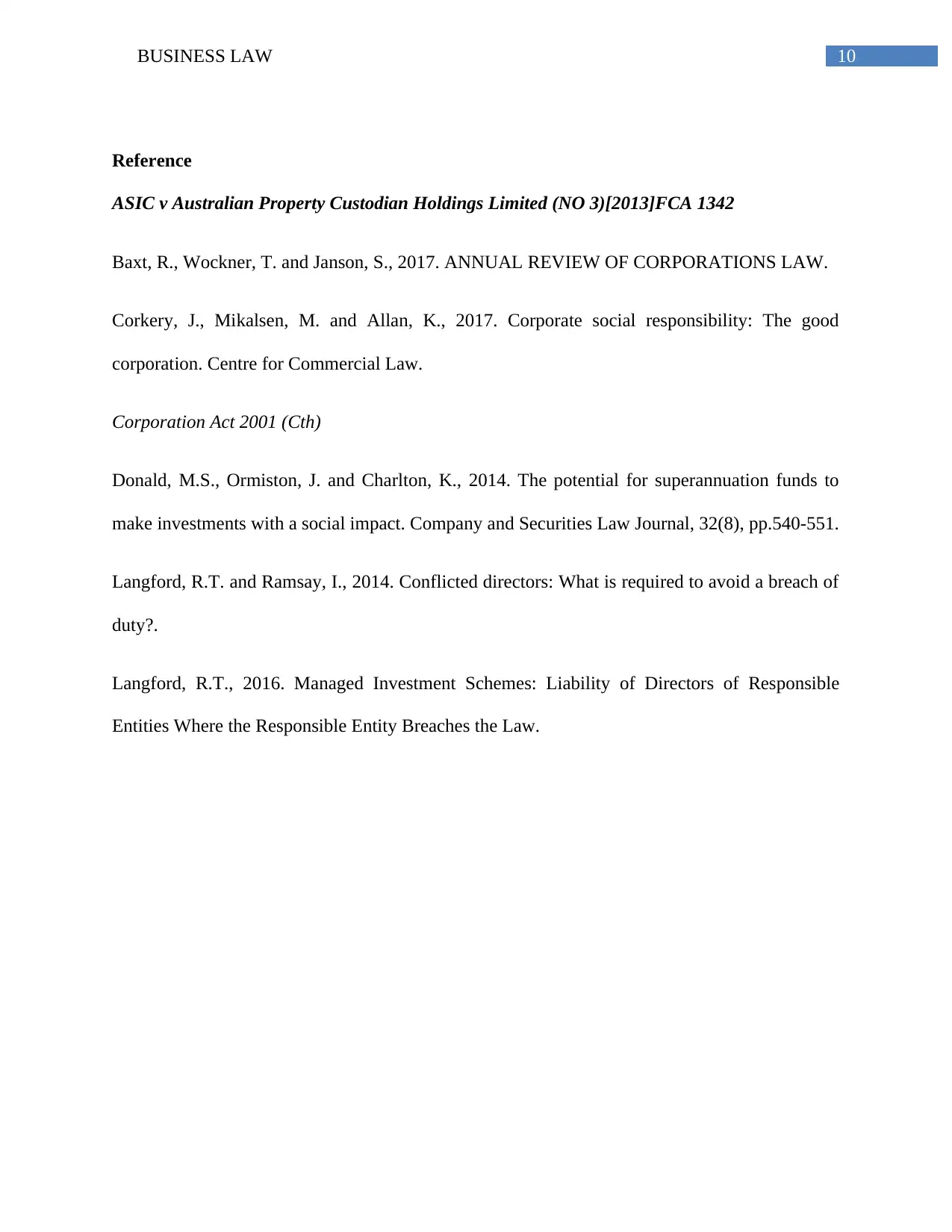
10BUSINESS LAW
Reference
ASIC v Australian Property Custodian Holdings Limited (NO 3)[2013]FCA 1342
Baxt, R., Wockner, T. and Janson, S., 2017. ANNUAL REVIEW OF CORPORATIONS LAW.
Corkery, J., Mikalsen, M. and Allan, K., 2017. Corporate social responsibility: The good
corporation. Centre for Commercial Law.
Corporation Act 2001 (Cth)
Donald, M.S., Ormiston, J. and Charlton, K., 2014. The potential for superannuation funds to
make investments with a social impact. Company and Securities Law Journal, 32(8), pp.540-551.
Langford, R.T. and Ramsay, I., 2014. Conflicted directors: What is required to avoid a breach of
duty?.
Langford, R.T., 2016. Managed Investment Schemes: Liability of Directors of Responsible
Entities Where the Responsible Entity Breaches the Law.
Reference
ASIC v Australian Property Custodian Holdings Limited (NO 3)[2013]FCA 1342
Baxt, R., Wockner, T. and Janson, S., 2017. ANNUAL REVIEW OF CORPORATIONS LAW.
Corkery, J., Mikalsen, M. and Allan, K., 2017. Corporate social responsibility: The good
corporation. Centre for Commercial Law.
Corporation Act 2001 (Cth)
Donald, M.S., Ormiston, J. and Charlton, K., 2014. The potential for superannuation funds to
make investments with a social impact. Company and Securities Law Journal, 32(8), pp.540-551.
Langford, R.T. and Ramsay, I., 2014. Conflicted directors: What is required to avoid a breach of
duty?.
Langford, R.T., 2016. Managed Investment Schemes: Liability of Directors of Responsible
Entities Where the Responsible Entity Breaches the Law.
1 out of 11
Related Documents
Your All-in-One AI-Powered Toolkit for Academic Success.
+13062052269
info@desklib.com
Available 24*7 on WhatsApp / Email
![[object Object]](/_next/static/media/star-bottom.7253800d.svg)
Unlock your academic potential
Copyright © 2020–2026 A2Z Services. All Rights Reserved. Developed and managed by ZUCOL.





